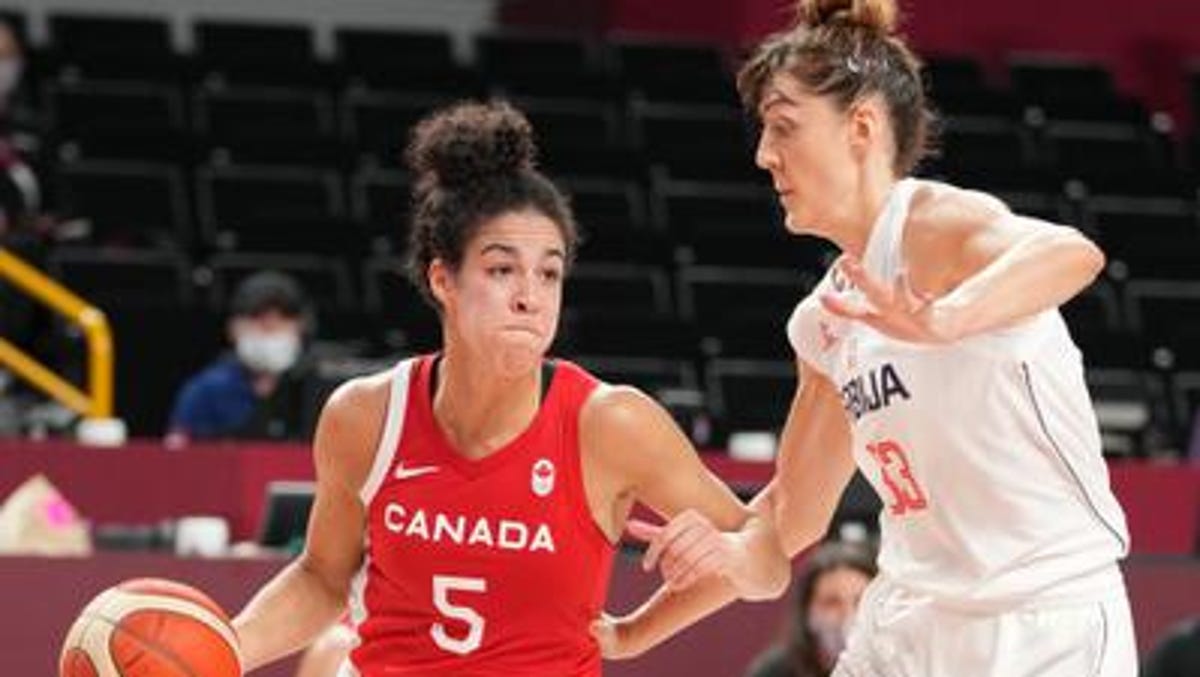It has been a disappointing summer for basketball in Canada.
After the Canadian senior men’s team was eliminated by underdog Czech Republic in the semi-final of their Olympic qualifying tournament in Victoria B.C., the women’s team entered the 2021 Olympics ranked an all-time high No. 4 in the world and had a spot on the podium on their minds. After all, this was a team bringing back 6 Olympic veterans and 3 three-time Olympians.
Unfortunately, a tight loss to Serbia in their first game of the tournament followed by a big win over Korea meant that the Canadians needed to defeat Spain on Saturday night in order to guarantee themselves a spot in the quarter-final. Instead, the Canadians fell to Spain 76-66, and will have to scoreboard-watch over the weekend in order to see if their 1-2 record and +7 point differential will be enough to move on past the group stage.
I want nothing more than for basketball to grow and thrive in Canada, but over the last month in Victoria and Tokyo, it's been brutal.
It was podium or bust for the women's program at these Olympics. Sitting on a hope and prayer for a tiebreaker entry now is an embarrassment.
— Arash Madani (@ArashMadani) August 1, 2021
Canada entered the game knowing that they would have to play fast. After all, the Spanish are a big and physical team that thrives in the half-court after so many years of playing together and learning each others habits, whereas the Canadians have been best all tournament when they force turnovers and score in transition. They did a good job of that against the Spanish, turning the game into track meet at times and forcing 21 turnovers. But Canada struggled to finish good looks all night, scoring only 11 points in transition and 14 points off turnovers compared to Spain’s 26 (on fewer turnovers).
Canada’s defense gave them a chance. The problem, aside from a lack of finishing good looks both from outside the perimeter — where the Candians shot just 1/4 outside of Kia Nurse’s 4/7 — and in the paint — where Canada blew several timely layups and missed open jumpers, shooting just 37.5 percent from the field on the night — was that Canada’s half-court offense was putrid. When Spain forced Canada to slow down, the Canadians had no answer and either took tough shots or turned the ball over by trying to do too much. When forced into isolation, Canada’s guards just couldn’t finish over Spain’s big back line of Astou Ndour and Laura Gil.

The only source of life for Team Canada outside of Kia Nurse’s timely threes and Bridget Carleton’s shotmaking were the youngsters: Shaina Pellington and Laeticia Amihere both entered the game for the first time with 1:12 left in the first quarter and immediately changed the complexion of the game. Amihere’s length and activity caused turnovers, and Pellington pushed the ball up the floor quickly, using their youth to muck up the game and make good things happen. The young women helped Canada win both the second and fourth quarters, each going +12 in a 10-point loss where none of their other teammates were pluses.
Of course, it wasn’t a perfect game for Pellington or Amihere. Their youth showed up in both good and bad ways, with Amihere turning the ball over by trying to make something happen with 10 seconds left in the first quarter rather than playing out the clock, and Pellington failing to convert on good looks, going 0/3 on the night for just 3-points. But their defense and Amihere’s 10 points and 6 rebounds were crucial in keeping the Canadians in the game until late and giving them a chance to still qualify for the quarter final, which could come down to score differential.
Assuming my math is correct, Canada reaches the quarterfinal if any of the following happens:
Korea beats Serbia by any score
Nigeria beats Japan by 40 or less
USA beats France by at least 15
Puerto Rico beats Australia by 83 or less
Australia beats Puerto Rico by 23 or less https://t.co/LWamwo2qTy— Brian Swane (@BrianSwane) August 1, 2021
That shouldn’t have necessarily been the case. Instead of grabbing the game by its horns, Canada’s veterans failed to show up in crucial moments on Saturday against Spain and throughout this whole tournament. Nurse finally got it going in the second half, converting on 4 threes on the night, and Natalie Achonwa had 11 points and 6 rebounds, but the two of them along with Miranda Ayin shot just 10/27 from the field. Worse than that, they combined for 8 crucial turnovers and made several timely mistakes that were uncharacteristic for the veteran Canadians, including bad clock awareness, miscommunications, and defensive mistakes on the perimeter.
On the other side of the ball, it happened to be Spain’s veterans who got the job done. Thirty-year-old Christina Ouvina and 31-year-old Alba Torrens combined for 27-points on 4/5 shooting from three to power Spain’s backcourt. But the frontcourt was where Spain really did the damage. Despite giving up 10 offensive rebounds to the Canadians, Spain’s backline of Gil and Ndour held it down on both ends of the floor, swarming the Canadians with their half-court defense by forcing 18 turnovers, protecting the rim for 5 blocks, snagging 18 rebounds, and limiting the Canadians to just 26 points in the paint (compared to 44 for Spain). Offensively, Gil and Ndour combined for 28-points on an extremely efficient 13/17 shooting, and their size was ultimately too much for the smaller and less physical Canadians to contend with.
Ultimately, the Spanish side looked like the more composed and veteran of the two, making fewer mistakes and controlling most of the game. The Canadians had their fair share of chances to come back — at times their defense with the youngsters on the floor was so overwhelming that it looked like they would through sheer chaos and force of will — but the Canadians fell short because they couldn’t execute when it mattered most.
The mix of youth and veterans present on this roster that people have been talking about all tournament was very apparent against the Spanish, but it didn’t always look like such a clean mix. Instead, it looked like different women playing at different speeds and expecting different things from each other, at least on the offensive end, rather than a cohesive group of five players on a string. That can’t happen in a game as important as this was, and it could spell the end of the tournament for the Canadians. Or… with a little bit of luck, the Canadians will have a chance to avenge themselves in the quarter final. That’s Olympic basketball for you.



